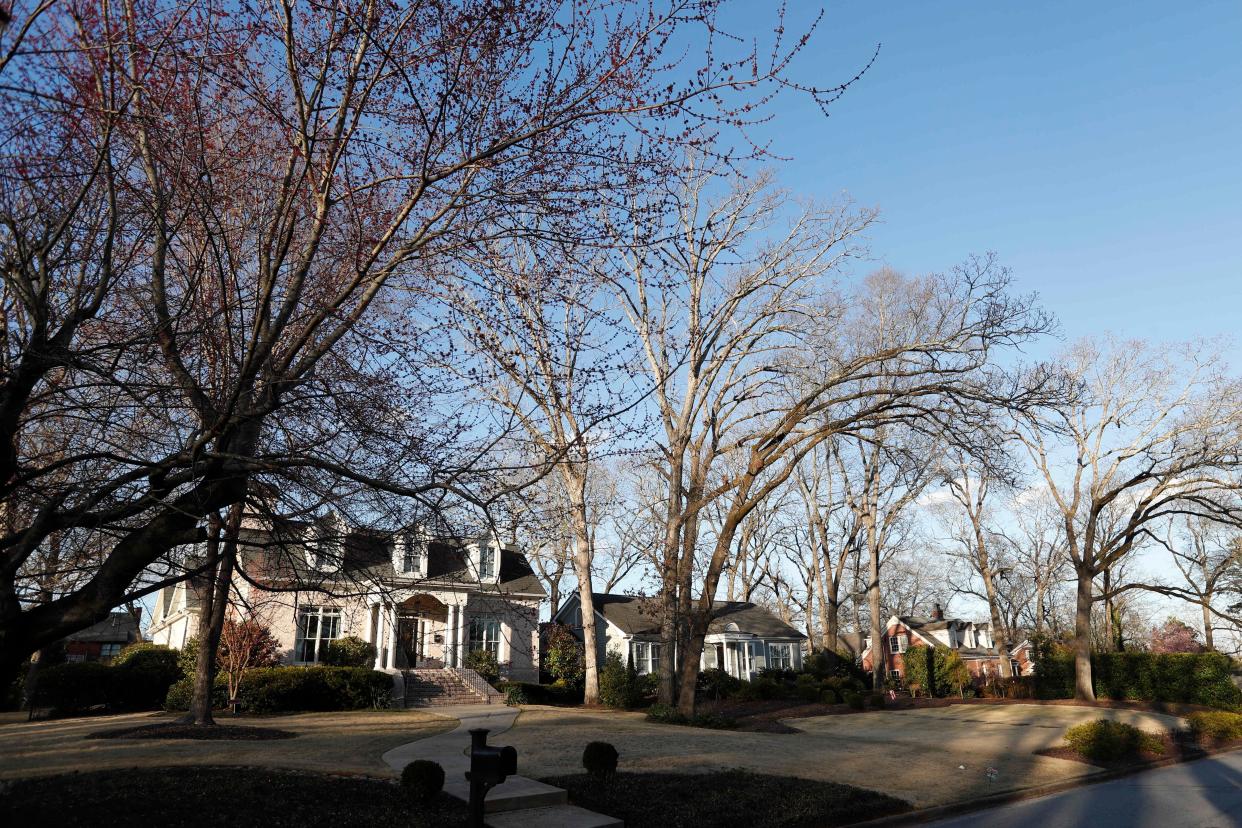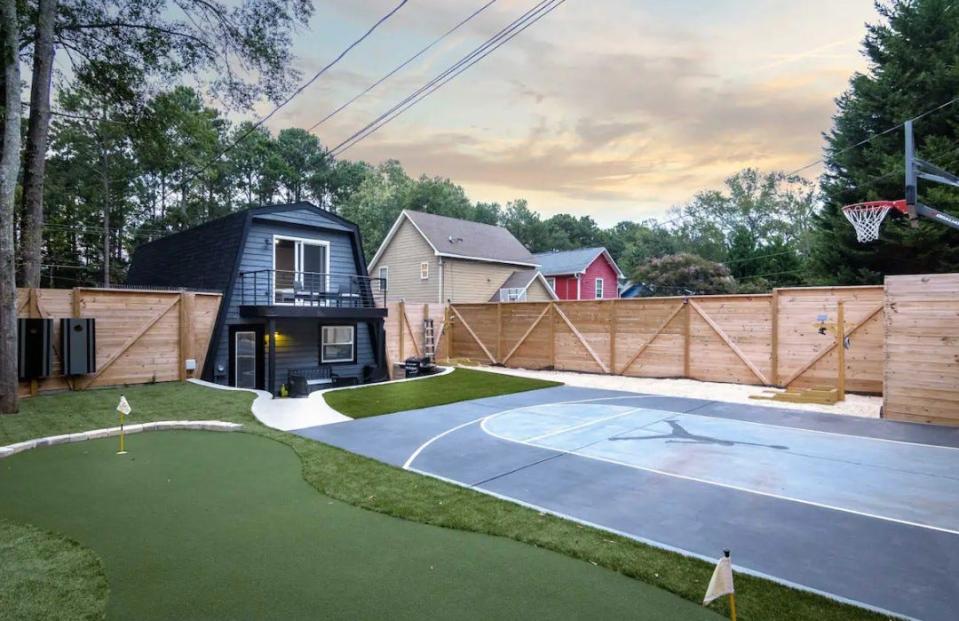Athens officials pass zoning rule to halt growth of short-term rentals. But is it enough?

Soon after Athens-Clarke County commissioners approved a zoning ordinance amendment aimed at halting proliferation of problematic non-owner-occupied residential commercial short-term rental properties (STRs), particularly in single-family residential areas, a commission committee has begun tweaking the new rules.
The move to adjust the amendment is not unexpected. On Feb. 6, Mayor Kelly Girtz referred the amended ordinance to the commission’s Government Operations Committee (GOC) for additional work. That referral came immediately upon the commission’s 9-0 adoption of the amendment at the Feb. 6 meeting. Commissioner Allison Wright, who owns a short-term rental property, recused herself from the discussion and vote.
Work by the GOC to refine the amendment is a result of the potential for legal action by at least some STR owners. At issue for those owners is an amendment provision, added last month by the county’s planning commission and part of the Feb. 6 approval, that would eventually prohibit STRs that don’t conform to the amended ordinance from continuing to operate as STRs.
Under that “sunset” provision, non-conforming STRs, based on a list to be developed by the county, would have that use declared “null and void” two years after the list of non-conforming properties is completed by the county.
Previously: Residents complain about 'parties' as Athens-Clarke approves moratorium on new Airbnbs
What's the problem with short-term rentals?
Popular with visiting University of Georgia football fans and visitors to the community’s numerous annual festivals and events, non-owner-occupied STRs have become an issue in many single-family residential areas as they have created noise, parking, trash, and other problems for full-time residents.
Outside of the “sunset” provision, the amended ordinance – the county’s first regulation of commercial STRs – will require commercial STR owners to provide the name, address and phone number of the property’s managing agent or local contact to property owners with 300 feet of the STR property boundary.
That information must also be provided to commercial STR renters, along with information on the maximum number of vehicles allowed on the property and where they should be parked and notice of applicable noise provisions in the county code. Also under the amended ordinance, no recreational vehicles, tents, or other structures are allowed as accommodations on STR properties.
The amended ordinance also addresses “home occupation” STRs, short-term-rental properties occupied by the homeowner that accommodate only a few guests. Those STRs can continue operating if they are covered by any required special-use or home occupation permits. Home occupation permits will be considered invalid if the associated STR is not rented for 12 months.

How big is the problem?
There currently is no accurate count of STRs operating in the county, although informal estimates place the number somewhere in the hundreds to possibly as many as 1,000. Officials are working to develop a list of STRs operating in the county and should be presenting those numbers to elected officials at the end of the month. Those initial numbers will not include the numbers of STRs operating outside of conformance with the amended ordinance.
There is a concentration of commercial STRs in Five Points, at the edge of the university campus and within walking distance of Sanford Stadium. According to Commissioner Mike Hamby, who represents the neighborhood, “there’s been plenty of (situations) where houses sit empty during the week while (residents) are trying to build (a) neighborhood (and) build community, and we ought to help that.”
What are they saying?
STR owners who spoke at the Feb. 6 meeting contended that those which are owned and operated locally are well-maintained and well-watched and are being unfairly lumped together with STRs operated by absentee owners.
“Real-estate investment is one of the most common ways for families to grow their wealth, and the purchase of a house in Athens is an investment in Athens itself,” the local owner said. “Now, after the fact, forcing all of these owners at once to sell their properties, or to become long-term landlords, is not a trivial hardship for them.”
One the other side of the issue are lots of people like Marilyn Vickers, a Five Points resident who was among those who spoke Feb. 6 in favor of the two-year sunset provision.
“… I speak for the rights of community members … to expect standards to be upheld in our neighborhoods, and to have the rules apply across the board,” Vickers said.
Vickers went on to note that problems with STRs appear not to be with local owner-occupied or owner-supervised properties, but with “residences that are not occupied by owners or renters on a long-term basis. They sit empty some of the time, and when occupied, it is often from people who are out of town and have no investment in the community.” And, she added, “no one is easily available when there is a problem, no one is accountable.
“When homes are snapped up by investors who will not live and work here, it hollows out communities,” Vickers continued, “and changes the conditions that make a place great to live … .”
What the potential legal woes?
Parameters of opposition by STR operators to the amended ordinance were also laid out at the Feb. 6 commission meeting.
Local attorney David Ellison, representing several STR owners, told commissioners with regard to the two-year “sunset” provision that a recent Georgia Supreme Court ruling prohibits elimination of non-conforming property uses within a specific period, unless affected property owners are compensated for the lost use.
“That’s exactly what’s happening here,” Ellison told commissioners. “At the end of the day, an ability to lease property is a fundamental right, and any interference with that right is considered a taking” of the affected property that is subject to legal challenge, he warned.
Ellison went on to contend that the county’s rationale for the ordinance amendment, which includes concerns related to heavy occupancy of STRs, noise, increased street parking, and mounting trash, could be handled through other means than sunsetting non-complying STRs.
“If you pass this tonight, you put property owners on the clock to take legal action,” Ellison told commissioners at the Feb. 6 meeting.
Hamby, who sits on the GOC, was not cowed by the potential for legal action.
“If we as a body made our decisions based on the number of times people say they’re going to sue us, we wouldn’t make any decisions,” Hamby said at the Feb. 6 meeting. “… We can’t be held hostage by something that may happen. We just have to keep moving forward and do what … the residents (who want controls placed on non-conforming STRS) are asking us to do.”
“Short-term rentals may have their place, but neighborhoods have their place, too,” Hamby added. “There’s also people in the community that are impacted by this who also have a right to sue (in connection with adverse effects of STRs on their neighborhoods) and that’s something we should factor in as well.”
Girtz, though, while decrying the current legal landscape for STRs, asserted to commissioners that across Georgia, “case law would certainly not support a sunset clause − certainly not a two-year, and maybe not one at all.”
More: 'A crazy market': First-time homebuyers confronted with competition, high prices in Athens
Getting some relief
The GOC recently heard from John Hawkins of the county attorney’s office about adding a “relief valve” provision to the amended ordinance, which could allow STR owners affected by the two-year sunset to continue operating until they have recouped investment in their property.
Part of a “relief valve” provision would establish an administrative means for affected STR owners to seek an extension from the county to operate their properties.
As part of developing a “relief valve,” county officials, Hawkins said, must determine how affected property owners would be required to show and prove they should be allowed to recoup their investment through continued STR operation.
It is likely to take some time to formulate how a “relief valve” would work, Hawkins added, because it is “a somewhat novel concept, particularly in Georgia.” The county, he added, should take “a little bit of time to make sure we’re getting that right.”
One of the issues the county government is likely to confront, County Manager Blaine Williams told the GOC, is how long a timeline to continue operating as a non-conforming STR should be allowed under a “relief valve” provision.
Those determinations, Williams added, “could be problematic, and a bit controversial, too,” given that residents might not understand the granting of any given “relief valve” timeline in their neighborhood.
But. Williams nonetheless concluded, “It’s good to have potential avenues for people that are seeking relief, because if they don’t get the relief they want, it could end up in court.”
Any addition of a “relief valve” provision would have to go through the county’s appointed planning commission before heading to the county commission for action, a process that could take a few months.
This article originally appeared on Augusta Chronicle: Athens-Clarke commission seeks to better regulation short-term rentals

